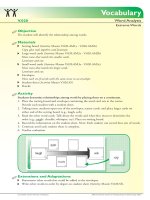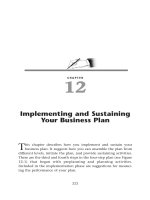634Lesson Plan Mendez v Westminister Final2f2e
Bạn đang xem bản rút gọn của tài liệu. Xem và tải ngay bản đầy đủ của tài liệu tại đây (210.32 KB, 2 trang )
Model Lesson Plan
Rick Flato
George Bush High School
Course:
United States History
Grade Level:
11
Title of Unit:
Civil Rights Movement
or
Hispanic Heritage Month
Title of Lesson:
Mendez v. Westminster:
to Brown
Time Frame:
50 minutes
Prelude
Description
This primary source-based lesson provides students with insight into the Hispanic Civil Rights Movement dealing with
educational segregation. Using Plessy v. Ferguson as a starting point, students will explore the legal justifications for
educational segregation and how the Mendez (1946) case changed California law and became a springboard for the
historic Brown v. Board of Education decision United States Supreme Court in 1954.
TEKS Objectives
US9(I)
Describe how litigation such as…Mendez v. Westminster...played a role in protecting the rights of the minority
during the civil rights movement.
US22(C) Describe U.S. citizens as people from numerous places throughout the world who hold a common bond in
standing for certain self-evident truths.
US29(A) Use a variety of both primary and secondary valid sources to acquire information and to analyze and answer
historical questions.
US29(G) Identify and support with historical evidence a point of view on a social studies issue or event.
Teacher to Teacher Notes
• This lesson can be used during Hispanic Heritage Month (September 15 - October 15).
• The lesson is based on the California District Court case of Mendez v. Westminster (1946) along with supporting
information from the U.S. Supreme Court case Plessy v. Ferguson (1896).
• In preparation for this lesson:
o Read essay, “We Always Tell Our Children They Are Americans”: Mendez v. Westminster and the
California Road to Brown v. Board of Education by Vicki L. Ruiz (College Board Review Issue 200,
Fall 2003)
o Run set of classroom copies for the following handouts: Plessy v. Ferguson Decision, Mendez v.
Westminster Plaintiffs Statement, Video Questions (excluding Possible Answers)
o Run enough copies of Student Story Board and Rubric for every student group project. (Students
should work in groups of 2-4)
o For the assessment, use The Write Stuff Strategies for Teaching Writing in a Social Studies
Classroom, 1999, James L. Smith, Suncrest Publications, 1670 Palo Verde, Las Cruces, New
Mexico, 88004.
Materials needed:
Websites used:
/>(Video used in Explore section of Procedures/Activities)
Plessy v. Ferguson Mendez v Westmin
Decision
Plaintiffs Statement
Story Board
Template
Story Board Rubric
Video Questions
/>(On this site you will find the “We Always Tell Our Children
They Are Americans” reading along with other documents
and videos related to Mendez v. Westminster.)
Procedures/Activities
Engage—Ask students what they know about the Mexican-American civil rights movement. Ask the Latino and Asian
students if they attended a segregated or integrated elementary school. Ask students which type of school they
would prefer and have them justify their response. Ask students by what method minorities in the USA gained
equal access to public accommodations including the public school system.
Explain—Distribute handouts: Plessy v. Ferguson and Mendez v. Westminster. Have students take out a sheet of paper
to take notes. Have a student read the Plessy decision, clarify any misunderstandings, and have students
answer Question #1. Allow 3 minutes for written responses and have students share. Make sure the students
understand the basic assumptions of the Plessy decision before moving on. Repeat the same procedure for
the Mendez complaint.
Explore—Distribute the Mendez v. Westminster Video Questions. Before playing the video, have the students look over
the questions to be answered. Tell the students you will play the video through 2 times, this way they can listen
once and answer the questions the second time through. Have students answer the questions on their paper.
When the video is completed, clarify any misunderstandings.
Then distribute individual copies of the Mendez v. Westminster Story Board. Explain to students that they will
now create a storyboard using their notes. Each heading has a space for an illustration and a caption. Working
in groups of 2-4, students can help each other come up with ideas and complete the storyboard before the end
of class. Collect or have students complete at home.
Assessment(s)
Evaluate—
• Assess story boards using rubric found in Materials Needed section.
• Using “Note Passing, The Legal Way” strategy from The Write Stuff: Strategies for Teaching Writing in a Social
Studies Classroom, pair students (if an odd number, teacher will pair up). Before providing the assertion, have
students decide who will agree and who will disagree within the pair. Have each pair take out one sheet of paper
and have each student write their name and whether they agree or disagree. Write this assertion on the board:
“The Westminster School district was correct in segregating Spanish-speaking students until
they reached middle school”
Using a web-based timer to project or some other means, the student that agrees takes 2-3 minutes to write a
persuasive defense. When time is up, they pass the paper to the one who disagrees who then writes a
counterargument. Repeat this process once more and stop. Call on student volunteers to read their responses.
Collect and use for a grade, if desired.
Instructional Alternatives
Extend—Students can create an illustrated acrostic poem: Mendez v. Westminster. Each letter must be word (no articles
or pronouns accepted!) that begins a sentence detailing information about Mendez v. Westminster. Illustrations
can follow each letter or be part of an overall theme.
Interdisciplinary Connections
Note taking and paraphrasing are used in all subject areas. Using a storyboard with illustrations helps visual learners as
well as giving budding artists an opportunity to “strut their stuff”. The writing assessment is a fun and engaging activity
that will help students with their self-expression and give them much-needed writing practice .









